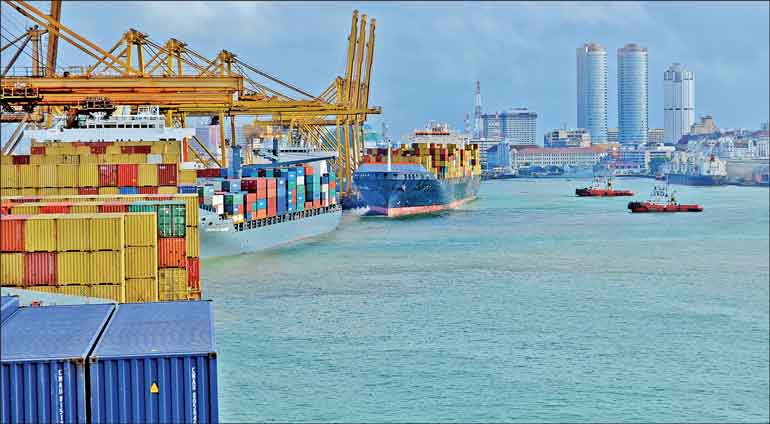Wednesday Feb 25, 2026
Wednesday Feb 25, 2026
Monday, 30 September 2024 00:16 - - {{hitsCtrl.values.hits}}


President
Anura Kumara Dissanayake
The Ceylon Association of Shipping Agents (CASA) extends its congratulations to Anura Kumara Dissanayake on his election as the 9th Executive President of the Democratic Socialist Republic of Sri Lanka. We wish him a successful tenure. CASA also congratulates Vijitha Herath on his appointment as the new Minister of Transport, Highways, Ports, Shipping and Civil Aviation, and we are hopeful that his leadership will support Sri Lanka’s aspirations to become a leading maritime hub in the region.
Sri Lanka, an island nation strategically positioned in the Indian Ocean, has long recognised the immense potential of its maritime sector. As the country stands at the crossroads of major trade routes connecting Europe, Asia, and the Middle East, its geographical advantage has become increasingly significant. In recent years, the Sri Lankan Government, alongside key industry stakeholders such as the Ceylon Association of Shipping Agents (CASA), has made remarkable progress in modernising the maritime sector, improving infrastructure, and fostering a conducive regulatory environment. This strategic focus has not only enhanced the country’s position as a maritime hub but has also created new opportunities for global trade and investment.
The shipping agency industry: A pillar of economic growth
The shipping agency industry in Sri Lanka consists of nearly 150 licensed companies, ranging from large multinationals to small and medium-sized enterprises (SMEs). This sector employs over 12,000 people, from junior executives to CEOs, and generates more than Rs. 60 billion annually, with Rs. 12 billion contributed to the Government through taxes. Notably, 90% of this revenue is generated in USD, underscoring the industry’s significant contribution to the national economy.
These shipping agencies handle a wide array of operations, including container, breakbulk, dry and liquid bulk cargo, car carriers (RO/RO), bunkering, ship repairs, crew changes, maritime security (PMSCs) passenger cruise liners and more. On average, around 5,000 ships call at Sri Lankan ports each year, handling over 104 million tonnes of cargo, of which 93 million tonnes were in containers (6.95 million TEUs) in 2023. This robust activity highlights the crucial role the shipping sector plays in facilitating international trade and driving economic growth.
Sri Lanka’s strategic maritime advantage and infrastructure development
Sri Lanka’s geographical location has always been a natural asset. Situated along key global trade routes, the island is ideally positioned to serve as a transshipment hub, connecting Europe, Asia, and the Middle East. The proximity to major shipping lanes, combined with deep-water harbours, enhances its appeal to global shipping lines.
Recent investments in port infrastructure have further solidified Sri Lanka’s status as a preferred maritime destination. The Colombo Port, a cornerstone of the country’s shipping industry, has undergone significant expansion, enabling it to accommodate larger vessels and increasing cargo volumes. Meanwhile, the Hambantota Port has added a new dimension to the maritime landscape, offering opportunities for trade diversification and investment in emerging sectors.
Regulatory reforms: A call for transparency and efficiency
While infrastructure development has been pivotal, the need for enabling regulatory reform remains critical. The shipping industry calls on the Government to further strengthen capacity, improve transparency, and streamline operations to ensure Sri Lanka’s continued competitiveness. This includes digitalisation efforts to modernise and harmonise processes across stakeholders, reducing inefficiencies and delays.
Greater transparency is also essential for fostering trust and attracting investment. Public consultation before implementing new policies and regulations, along with measures to prevent corruption, can create a more accountable and effective regulatory environment. Anti-corruption laws, enhanced enforcement, and ethical conduct within the maritime sector will contribute to long-term sustainability.
CASA’s role in promoting global competitiveness
As the leading voice of Sri Lanka’s shipping industry, CASA plays a proactive role in advocating for reforms that align with global standards. Through regular engagement with stakeholders, CASA is actively involved in improving Sri Lanka’s rankings on the Logistics Performance Index and the Ease of Doing Business Index.
The association has worked closely with Government ministries, including the Ministry of Ports and Shipping, the Ministry of Finance, and Sri Lanka Customs, to propose tax reforms that encourage growth in marine activities, including bunkering and the Sri Lanka Flag Registry. These efforts are crucial in enhancing the industry’s overall competitiveness and attracting new business.
Youth engagement and leadership development: Shaping the future
CASA is deeply committed to the development of emerging leaders in the maritime industry. The association’s youth engagement and leadership development programs aim to empower young professionals with the skills and knowledge needed to take on responsibility in shipping and trade. The Young Shipping Professionals group, now known as YoungShip Sri Lanka, is a key initiative that nurtures and develops young talent within the industry.
YoungShip’s objectives include increasing networking opportunities, promoting inclusivity, and providing training and knowledge-sharing platforms. CASA’s unwavering support for YoungShip underscores the association’s commitment to shaping the upcoming generations of industry leaders.
Crew management and Marine HR
CASA is at the forefront of elevating Sri Lankan seafarers to become world-class marine human resources, contributing significantly to the global fleet. Through advocacy and policy initiation, seafarer welfare initiatives and addressing industry challenges, CASA is making a substantial impact uplifting the Marine HR industry as a whole.
As a key partner in developing the National Marine HR Policy, currently in the Legal Draftsman’s Department, CASA aims to increase Sri Lankan seafarers to 50,000 from 16,000, generating an annual economic contribution of $ 1.5 billion from $ 420 million. Additionally, CASA facilitates collaborations with foreign governments and ship owners’ associations to provide opportunities for Sri Lankan seafarers on growing fleets worldwide by establishing bilateral, mutual recognition agreements with countries like the Kingdom of Netherlands, Türkiye and etc.
Furthermore, CASA’s endorsement of the “She can sail the seas” program underscores its commitment to promoting gender inclusivity at sea, marking a significant step towards diversity and equality bringing female seafarers of Sri Lanka to the forefront.
Digitalisation: Driving innovation and efficiency
In line with global trends, digitalisation is a key area for innovation within Sri Lanka’s maritime sector. The adoption of digital technologies, including electronic documentation, paperless transactions, and advanced port management systems, port community systems, maritime single window, is crucial for improving operational efficiency. The use of blockchain technology in supply chain management can further enhance transparency and reduce costs, positioning Sri Lanka as a forward-thinking maritime hub.
CASA has been a strong advocate for digitalisation, supporting platforms such as ASYHUB (for pre-arrival processing), Port Community System (PCS), Maritime Single Window (MSW), and a National Single Window (NSW) to streamline operations and boost industry and trade efficiency and growth.
Sri Lanka, currently ranked 73rd out of 139 countries in the 2023 Logistics Performance Index (LPI), is falling behind its neighbours, India and Malaysia. To enhance its global competitiveness and achieve its maritime and logistics hub aspirations, the country must prioritise digitalisation which is crucial for enhancing logistics efficiency. Implementing technologies like electronic port community systems, blockchain, and the Internet of Things can improve transparency, tracking, and overall operations.
Towards a unified maritime authority
CASA continues to advocate for the creation of a single maritime governing body in Sri Lanka, akin to Singapore’s Maritime and Port Authority (MPA). Such an entity would bring all stakeholders and government institutions under one unified regulator, ensuring more consistent and efficient governance of the maritime sector. This would further bolster Sri Lanka’s standing as a competitive maritime hub in the Indian Ocean.
Charting a course for the future
Sri Lanka’s maritime industry is poised for significant growth, supported by strategic investments, regulatory reforms, and digitalisation. To capitalise on this momentum, continued collaboration between the government, CASA, and industry stakeholders is crucial. By driving further innovation, enhancing global competitiveness, and fostering future leaders, Sri Lanka can secure its place as a leading maritime hub in the Indian Ocean.